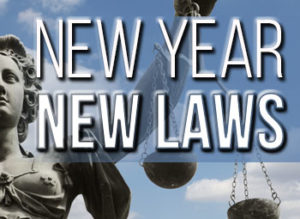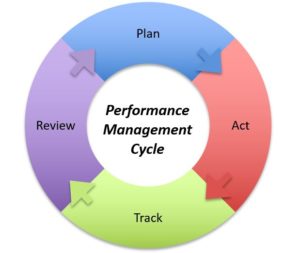Tracy Emmerich | November 21, 2018
The coming of a new year means the coming of new California employment laws! As always, Leap Solutions is at the ready to guide you through changes that could impact your organization, your employees and your bottom line in 2019.
Mandatory Sexual Harassment Training

Senate Bill 1343 requires employers of five or more employees (including seasonal and temporary employees) to provide certain sexual harassment prevention training by January 1, 2020. Within six months of assuming a position (and once every two years thereafter), all supervisors must receive at least two hours of training, and all nonsupervisory employees must receive at least one hour of training. For seasonal or temporary employees who will work for fewer than six months, the training needs to take place within 30 calendar days of hire date or within 100 hours worked (whichever is earlier).
What this could mean for you: While this bill won’t be in effect until January 2020, employers should implement the required trainings in 2019 in order to be compliant by that date. In light of the #MeToo movement, there’s no better time than now to protect your company and your employees by doing everything you can to create a harassment-free work environment. There’s also no better time to move on from anti-harassment trainings of the past—ones that focused on avoiding legal liability—in favor of modern, more effective trainings that aim to reduce and prevent workplace harassment altogether. Strong facilitators will tailor new training approaches, including bystander intervention and civility training, to meet the varying needs of your specific workplace and your unique employees.
Protection Against Defamation
Effective January 1, 2019, Assembly Bill 2770 protects employers and sexual harassment victims from being sued for defamation by an alleged harasser (who, in the past, could claim injury to reputation). Complaints of sexual harassment by an employee, without malice and based on credible evidence, as well as any communications between an employer and interested persons regarding complaints, will be considered privileged and therefore protected from civil action. The bill further authorizes an employer to answer an inquiry from a prospective employer (such as during a reference check), again without malice and based on credible evidence, about whether the employer would rehire the employee and whether a decision to not rehire is based on the employer’s determination that the former employee engaged in sexual harassment.
What this could mean for you: Surely prompted by the #MeToo movement, protections like these exist to support victims in speaking out and allow employees to investigate claims without fear of liability. This is an ideal time to review and update your employee handbook and al
l written harassment and retaliation policies and be sure you’re consistently and regularly communicating these protections to all employees. It’s also appropriate to incorporate these policies into your sexual harassment prevention trainings. When you’re conducting a reference check on a potential new hire, consider asking whether the former or current employer would rehire the applicant and whether a decision not to rehire is based on the determination that the applicant engaged in sexual harassment. When answering the same question from another employer, however, be cognizant of the fact that this new law is non-specific about what—if any—detail you can safely provide about an alleged harassment.
Gender Options
Senate Bill 179 allows California residents to choose from three equally recognized gender options: female, male and nonbinary on birth certificates (effective September 1, 2018) and state-issued identification cards and driver’s licenses (effective January 1, 2019).
What this could mean for you: For employers, we advise using nonbinary, gender-neutral language on employment applications, employee handbooks and all other written materials. You want to honor an employee’s chosen name, gender identification and/or use of pronouns as well incorporate information on gender identity, gender expression and sexual orientation into sexual harassment prevention trainings. You’ll also want to respect an employee’s use of facilities that best correspond to their gender identity or expression.
Lactation Accommodation
Effective January 1, 2019, Assembly Bill 1976 requires employers to provide a location other than a bathroom (previously other than a toilet stall) for an employee to express breast milk. The location must be private and in close proximity to the employee’s work area. Ideally the location will be a permanent one, but it can be temporary provided it meets certain outlined conditions.
What this could mean for you: If you’ve designated a bathroom area for an employee to express milk, you’ll need to provide a new accommodation that satisfies the law’s requirements. However, the bill does include an exemption whereby an employer who can demonstrate an undue hardship to find such a location (due to the size, nature or structure of the business) will be required to make reasonable efforts to find a suitable location other than a toilet stall for an employee to privately express milk. The bill also contains a provision for agricultural employers to comply by allowing an employee to use the air-conditioned cab of a tractor or truck for expressing milk.
Salary History
Assembly Bill 2282 amends and clarifies ambiguities in last year’s Assembly Bill 168. Going forward, employers may inquire about an applicant’s salary expectations for a position, and employers need only provide a pay scale upon request to an external applicant—not a current employee/internal candidate seeking promotion or lateral transfer—when that applicant has already completed an initial interview.
What this could mean for you: This bill addresses pay inequalities and serves as a reminder of the importance of conducting a market-based compensation analysis to ensure that you’re paying your employees fairly and competitively. Leap Solutions Group can help you determine your compensation formula based on job, region, function and industry and develop or update pay scales and clear job descriptions.
 Don’t Forget!
Don’t Forget!
January 1, 2019 also brings another increase in hourly minimum wage:
- for California employers with 25 or fewer employees, minimum wage will be $11.00 per hour;
- for those with 26 or more employees, minimum wage will be $12.00 per hour.
Looking Forward

The bulk of California’s new employment laws reflect a larger trend—a movement toward greater awareness, tolerance and respect in the workplace. It’s clear that in coming years, we’ll only see
greater legal protections for all classes and characteristics (including race, national origin, sex, gender identity, gender expression and transgender status). Proactive employers will choose to strengthen your commitment now to fostering a work environment that is not only current and compliant, but one that is inclusive, validating and forward-looking.
Whether you want to offer compelling sexual harassment prevention trainings to your employees, refresh your employee handbook with nonbinary, gender-neutral language or conduct a thorough, market-based compensation analysis, the HR professionals at Leap Solutions can help. We’ve got the expertise, tools and resources to steer your organization confidently through ever-changing legislation and empower your people to thrive.
Are you ready to Leap in 2019?
Click here to print this newsletter
Chuck McPherson | June 28, 2018
Leap Solutions recently launched HR2Leap, a thriving new program offering HR consultation, guidance and coaching services to organizations of all sizes and industries. We’re thrilled with the reception and proud of the difference we’re already making for the many clients who have taken the leap into HR2Leap.
When you engage with HR2Leap, we become your seasoned partner, your trusted resource and your invaluable guide for any and all HR matters.
In a Nutshell
Our HR2Leap packages provide top-quality HR without the expense of hiring a full team. For immediate relief and long-term support, HR2Leap is completely flexible and entirely customized to your unique business needs, goals and budget. Simply select a package—5, 10 or 15 hours per quarter—and count on us to keep you covered with just the right HR essentials and expertise.
Making Things Better
New and existing clients are leveraging HR2Leap services in their own creative ways and for all sorts of situations:
- New Hires. A small (but growing!) family-owned business with no in-house HR person took advantage of HR2Leap for support when hiring a few new employees. We contributed expertise and insight on industry- and market-competitive compensation and benefit packages and offer letters, as well as things they might not have even considered, such as the value of employment contracts, introductory periods and more.
- Leave of Absence. Another client, a larger organization, reached out to HR2Leap with a delicate employee-relations issue they hadn’t before encountered. An employee had been absent for several days, and productivity was suffering. While in-house HR was aware of new laws regarding leaves of absence, they weren’t entirely sure how to navigate them. The employer of course wanted to stay compliant, but they were also obliged to meet operational needs. Savvy and discreet, the experts at Leap helped the employer understand which laws were applicable and how they worked in this particular circumstance, communicate with the individual employee productively and respectfully, and implement solutions that protect both the employee and the organization.

- Performance Management. HR2Leap was an ideal resource for a medium-sized company with an employee who was demonstrating performance issues and behavioral problems but also happened to be experiencing a serious medical condition. The employer knew that there are employee protections in place for such a circumstance but felt unclear about the most appropriate and mutually beneficial way to broach the unavoidable discussion and securely handle the matter. With our depth of knowledge and experience, we were able to help the client consider the impact and possibilities of various scenarios, understand unfamiliar terms and, most importantly, minimize risk while maximizing success.
- A small medical practice enlisted HR2Leap services when an employee on standard pregnancy leave requested an extension. We worked together to help our client know and
 exercise employer rights and determine whether they had the abilities and resources to make necessary accommodations.
exercise employer rights and determine whether they had the abilities and resources to make necessary accommodations.
Meantime, further complications arose for the employee, and the situation developed into a disability case. We equipped the client with a solid understanding of pertinent employment law, the means to assess current and future risk, and the knowledge and flexibility to adequately and fairly meet the needs of all parties while maintaining compliance throughout the process.
There’s no way to successfully Google Search the countless tricky, unexpected situations that inevitably arise in HR. But no matter how unusual or complex the scenario, clients can rely on their Leap partners to capably and confidently walk them through it.
Peace of Mind

From on-the-job injuries or property damage to employee discipline and terminations, and from workers’ compensation claims to workplace harassment and discrimination investigations, the highly skilled Leap Solutions team has the experience, has the answers and has you covered with decades of HR expertise in countless industries.
What our HR2Leap clients appreciate most is the tremendous peace of mind in knowing the Leap team is at their service and at their convenience. They can use their 5, 10 or 15 hours however they like—10-15 minutes here, an hour there; by email, text, phone or in person. We’re an ever-ready sounding board and constant source of reliable, up-to-date information, resources and customized solutions.
You’ve seen what HR2Leap can do and how it has already benefitted some of our clients—imagine what it could do for you!

Please click here to download this newsletter
Tracy Emmerich | November 26, 2017
As the calendar year is winding down, Leap Solutions Group is gearing up to prepare employers for the many new employment and labor laws that could impact your organization, your employees and your bottom line in 2018. Here, we highlight just a few imminent changes and provide insights and recommendations for addressing each proactively and confidently.
Ban the Box on Criminal History
Effective January 1, 2018, Assembly Bill 1008 makes it unlawful under the California Fair Employment and Housing Act (FEHA) for employers with five or more employees to ask applicants about prior convictions on job applications. According to the bill, it’s illegal to inquire into or consider an applicant’s conviction history until after extending a conditional job offer.
At that time,  employers may conduct a background check but are prohibited from considering, distributing or disseminating information related to prior arrests not followed by convictions as well as any diversions and/or sealed, dismissed, expunged or eradicated convictions. Further, should an employer intend to deny a candidate a position solely or in part because of the candidate’s conviction history, the employer must make a clear, individualized assessment as to whether that history has a direct and adverse relationship with the nature and specific duties of the job. The bill explains detailed guidelines for notifying the applicant of the intended decision, granting time for the applicant to respond (and possible additional time to dispute the decision and gather evidence) and making and presenting a final decision. (Certain specified positions, including criminal justice agency jobs, are exempt from this bill.)
employers may conduct a background check but are prohibited from considering, distributing or disseminating information related to prior arrests not followed by convictions as well as any diversions and/or sealed, dismissed, expunged or eradicated convictions. Further, should an employer intend to deny a candidate a position solely or in part because of the candidate’s conviction history, the employer must make a clear, individualized assessment as to whether that history has a direct and adverse relationship with the nature and specific duties of the job. The bill explains detailed guidelines for notifying the applicant of the intended decision, granting time for the applicant to respond (and possible additional time to dispute the decision and gather evidence) and making and presenting a final decision. (Certain specified positions, including criminal justice agency jobs, are exempt from this bill.)
What this could mean for you: Meant to help formerly incarcerated people support themselves and their families with gainful employment, AB 1008 restricts employers’ abilities to make pre-hire and personnel decisions based on an individual’s criminal history. Employers should immediately review and update applicant screening procedures, including revising all job applications to remove any boxes that ask about prior convictions or criminal history. You must also refrain from inquiring about criminal history during interviews. As an alternative, you may opt to request criminal history information in your offer letter. You are still entitled to conduct a background check on any candidate after an offer is made (and you might want to consider doing so as a matter of course if you don’t already). However, should the results of an applicant’s background check alarm you and make you reconsider hiring, we urge you to consult with Leap Solutions Group. We can help you perform the required individualized assessment, make any adjustment to your offer, and ensure that you remain in compliance throughout the process.
Salary History
Effective January 1, 2018, Assembly Bill 168 makes it unlawful for employers to ask an applicant (or the applicant’s current or former employers)—orally or in writing, directly or indirectly—about prior salary, compensation and benefits. (Salary history may be discussed, however, if the applicant “voluntarily and without prompting” discloses it.) Employers may not use an applicant’s prior history as a factor in determining whether to offer employment or what salary to offer. In addition, upon request of a job applicant, employers must provide the position’s pay scale.
What this could mean for you: AB 168 aims to address pay inequalities. Employers should immediately review and revise all job applications to remove questions about previous salary or salary history. You must also refrain from inquiring about criminal history during interviews. This is an ideal time to conduct a market-based compensation analysis; Leap Solutions Group can help you determine your compensation formula based on job, region, function and industry and develop or update pay scales and clear job descriptions. (Don’t forget that 2018 also brings another increase in hourly minimum wage—as of January 1, for employers with 25 or fewer employees, minimum wage is $10.50 per hour; for those with 26 or more employees, minimum wage is $11.00/hour.)
Parental Bonding Leave

Effective January 1, 2018, the New Parent Leave Act (Senate Bill 63) requires California employers with 20-49 employees within a 75-mile radius to provide up to twelve weeks of unpaid, job-protected parental leave to bond with a new child within one year of the child’s birth, adoption or foster care placement. To be eligible, employees must have more than twelve months (and at least 1,250 hours) of service with the employer during the twelve-month period prior to the leave. Employees are entitled to use any accrued paid time off, such as paid vacation and sick leave, during the parental leave. In addition, employers must maintain and pay for the employee’s continued coverage under a group health plan at the level and same conditions that coverage would have been provided had the employee continued to work. If an employer employs both parents, and they are entitled to leave for the same birth, adoption or foster care placement, the parents’ combined leave will be capped at twelve weeks. An employer may (but is not required to) grant simultaneous leave to both employees.
What this could mean for you: The New Parent Leave Act allows more Californians to take leave to bond with a new child without fear of losing their jobs. If you’re an employer of 20-49 people and don’t already offer this type of bonding leave, you will need to fully understand eligibility and conditions and how they might impact your employees and your organization. You’ll want to develop and communicate clear policies and processes for facilitating and managing these new mandated parental leaves.
Paid Family Leave/State Disability Leave Expansion
For periods of paid family leave or state disability leave starting after January 1, 2018 (but before January 1, 2022), Assembly Bill 908 substantially increases the weekly benefit amount available under California Paid Family Leave (PFL) and State Disability Insurance (SDI) from the current 55 percent of earnings to either 60 percent (for higher wage earners) or 70 percent (for lower wage earners). AB 908 also eliminates the waiting period for PFL claims (but does not change the waiting period for SDI claims, which remains at seven days).
What this could mean for you: Employers should inform affected employees of their benefits and plan for any additional expenses. You’ll also want to monitor for any potential changes to payroll deduction rates.
Immigration Worksite Enforcement
Effective January 1, 2018, Assembly Bill 450 prohibits employers from voluntarily allowing federal Immigration and Customs Enforcement (ICE) officials to enter nonpublic areas of the workplace without a judicial warrant or to access, review or retain employee records without a subpoena (with exceptions). AB450 also requires employers to specifically notify affected employees (in writing in the language the employer normally uses to communicate employment information with each) of any ICE inspection of I-9s or other employment records within 72 hours of receiving notice of the inspection. AB450 further prohibits employers from re-verifying a current employee’s employment eligibility when not otherwise required by federal law.
What this could mean for you: While Governor Jerry Brown has made California a “sanctuary state,” his landmark legislation does not prevent or prohibit ICE or the Department of Homeland Security from acting on federal immigration enforcement. What you can do as an employer is know your and your employees’ rights and responsibilities and understand that some employees experience fear or concern. Most importantly, you must communicate thoroughly and effectively (and in writing) about any ICE inspection; to that end, the California Labor Commission will develop a template notice by July 1, 2018; until that time, employers are required to create their own written notices in accordance with the specific guidelines spelled out in AB 450 (Leap Solutions Group can help with interim notice writing and translation).
Notice Requirements
- Human Trafficking. California law currently requires certain types of employers (including but not limited to alcohol retailers, airports, emergency rooms and adult or sexually-oriented businesses) to post a specific notice concerning human trafficking and hotlines available for assistance. AB 260 extends this requirement to hotels, motels, and bed and breakfast inns. In addition, SB 225 requires the notice to state that an individual may text a particular number to access support and services.
- Transgender Rights. SB 396 requires employers to prominently post a poster, developed by the Department of Fair Employment and Housing, on transgender rights. (The bill also requires employers with 50 or more employees to include information on gender identity, gender expression and sexual orientation in prescribed sexual harassment prevention training for supervisors.)
Looking Ahead
- Agriculture Overtime. Beginning January 1, 2019, Assembly Bill 1066 will gradually lower the daily and weekly hours-of-work thresholds for paying overtime to agricultural employees. At the outset, employers will be required to pay agricultural employees 1-1/2 times their regular rate for all hours worked over nine in a day or over 55 hours in a week. (Employers of 25 or fewer employees will have a delayed phase-in starting January 1, 2022.) The thresholds will drop annually from there so that by year 2022 (2025 for smaller employers) agricultural employees will earn overtime wages on par with most other non-exempt employees.
Bottom Line
The HR professionals at Leap Solutions Group can demystify these and many other complicated new employment and labor laws for you and your HR staff, hiring managers and supervisors. We specialize in compliance; we stay continually up to date on federal, state and local requirements; and we have expertise in pay equity and compensation, management/employee training and handbooks, FEHC/FEHA, FMLA and much more. Moreover, as a small business ourselves, we appreciate how challenging it can be to do business amidst these ever-changing rules and regulations.
Count on Leap to guide you through the complexities of each new piece of legislation and provide the knowledge, tools and resources you need to respond efficiently, reduce legal risk, minimize expenses and achieve the peace of mind that comes with keeping your organization and your people safe, strong and successful.
Click here to download this newsletter
Chuck McPherson | February 23, 2017
Employment and labor laws are simply meant to protect rights and outline responsibilities in the workplace-but they’re anything but simple. Constantly changing and highly complex, they can overwhelm even the most on-the-ball employers and their HR staff, hiring managers and supervisors.
We’re here to alert you to some recent and upcoming HR changes that will impact your hiring practices, new hires and existing employees, and bottom line. And we’re eager to help you navigate the changes as wisely, efficiently and cost-effectively as possible.
If you’re considering any new hires in 2017, you’ll want to take particular note of the following changes:
Immigration Practices
Effective January 1, 2017, SB 1001 makes it unlawful for an employer to request more or different immigration documents than those required under federal law or to question the authenticity of or refuse to honor documents presented. Further, the bill makes it unlawful to reinvestigate or re-verify a continuing employee’s authorization to work (unless required by federal law).
Also, beginning January 22, 2017, employers must use the 11/14/2016 N version of Form I-9 (Employment Eligibility Verification) to verify the identity and work eligibility of every new employee hired. (The version date can be found on the lower left-hand corner of the form.) Prior versions of the form will no longer be valid for use.
How to respond: While you verify that new hires are either U.S. citizens or authorized to work in the United States, be mindful of the rules regarding which Form 1-9 to use, what eligibility questions are permissible during pre-employment screenings, and what type of immigration documents are acceptable. If you don’t comply, you could face a violation penalty of up to $10,000.
Juvenile Criminal History
Effective January 1, 2017, AB 1843 prohibits employers from asking job applicants to disclose any information regarding juvenile convictions and makes it unlawful to seek or use any information related to juvenile arrests, detentions, or court dispositions as a factor in employment determination.
How to respond: Review your policies and practices to be sure that “off-limits” information is not requested or considered during any part of the hiring process. Note: if you are an employer at a health facility, you may inquire about an applicant’s juvenile crimes if a juvenile court has ruled that the crime committed was a felony or misdemeanor involving sex crimes or certain controlled substance crimes and happened within five years of applying for employment (unless the record has been sealed).
Fair Pay Act Expansions
Effective January 1, 2017, SB 1063 prohibits an employer for paying any employees wage rates that are less than those paid to employees of another race or ethnicity. In addition, AB 1676 specifies that prior salary cannot, by itself, justify any disparity in compensation.
How to respond: Employers and employees must negotiate and set salaries based on the requirements and expectations of each position and the qualifications of the employee rather than his or her prior earnings. You’ll want to update job descriptions accordingly and revise any job applications that seek information about prior salary.
Minimum Salary Increase
If instituted, new Department of Labor overtime legislation (currently on hold during nationwide injunction) will almost double the minimum annual salary for full-time exempt employees to $47,476. This is higher than California’s minimum salary (which is no less than two times the state minimum wage) and will remain higher throughout 2017 (when state and federal minimums differ, you must comply with the more restrictive requirement of the two). In classifications.
How to respond: While we await a federal court outcome, you should confirm that you’re classifying each of your employees properly as exempt or non-exempt as well as consider honoring any salary increases or status changes that were implemented to meet the new threshold or status requirements. You might also conduct a cost analysis to determine whether your current compensation structure will work under the new regulations and make any necessary adjustments.
Legalization of Marijuana
While California has legalized recreational marijuana in California for people aged 21 and over, marijuana is still designated as a Schedule 1 substance under the federal Controlled Substance Act (CSA), which criminalizes the possession, manufacture, distribution and sale of the drug. We have yet to learn what the passing of Prop 64-as well as the discrepancy between state and federal marijuana legislation-will mean for California workplaces in terms of productivity, safety, employee privacy rights, zero-tolerance policies, drug testing methods and more.
How to respond: You’re still entitled to maintain drug-free workplaces. As you await legislation addressing issues that will inevitably surface, confirm your background check and drug screen methods, review consent forms, and maintain clear and consistent, well-defined and well-communicated drug-use policies.
Upcoming Laws in 2017
As you incorporate new hires into your workplace, keep these upcoming laws in mind:
- All-gender bathrooms: As of March 1, 2017, AB 1732 will require all single-user toilet facilities in any business establishment, place of public accommodation or government agency in California to be identified as “all-gender.” Update your facilities accordingly and obtain and install the appropriate signage.
- Workplace violence notices: Starting July 1, 2017, AB 2337 will obligate California employers with 25 or more employees to provide written notice—to new employees upon hire and current employees upon request—of their right to take protected time off, without threat of termination, discrimination or retaliation, for domestic violence, sexual assault or stalking. (You might choose to include this notice in your employee handbook.)
If you’re in one of these particular industries, take note:
- Health industry: Effective April 1, 2017, the Workplace Violence Prevention in Healthcare rule (California Code of Regulations/CCR Title 8, Section 3342) requires healthcare employers to develop and implement a specific written workplace violence prevention plan, review the plan and train employees annually, maintain a workplace violence incident log, report workplace violence as indicated, and more.
- Janitorial industry (and any California employer who employs at least one “covered worker” who enters into a contract, subcontract, or franchise agreement to provide janitorial services): Effective July 1, 2018, AB 1978 establishes requirements for the janitorial industry, including registering annually with the Labor Commissioner, to protect janitorial employees from wage theft and sexual harassment. It also requires employers to develop and implement biennial in-person sexual harassment and violence prevention training.
- Agricultural business (that means you, wine industry!): AB 1066 requires California employers to pay agricultural workers overtime over a four-year phase-in process. Beginning January 1, 2019 (though you may choose to implement sooner), employers are required to pay overtime for any hours worked over 9.5 hours per day or 55 hours per week (to incrementally lessen yearly until reaching 8 hours per day or 40 hours per week, beginning January 1, 2022). Also beginning on January 1, 2022, any employee who works over 12 hours per day must be paid at a rate no less than twice the regular rate of pay. (Employers with 25 or fewer employees will have an extra three years to comply with the phase-in.)
Thriving Through the Changes
How you respond and adapt to these complicated, ever-changing employment and labor laws is key to how you’ll thrive through them—and we can help you do just that. HR professionals who specialize in compliance and stay continually up to date on federal, state and local regulations and requirements, we have the tools and resources to keep you abreast of these and many other changes, help you develop a thorough understanding of how specifically they will impact your unique organization, and work with you to tailor a plan to address them with success.
Click here to download this article

 Don’t Forget!
Don’t Forget!

 exercise employer rights and determine whether they had the abilities and resources to make necessary accommodations.
exercise employer rights and determine whether they had the abilities and resources to make necessary accommodations.
 employers may conduct a background check but are prohibited from considering, distributing or disseminating information related to prior arrests not followed by convictions as well as any diversions and/or sealed, dismissed, expunged or eradicated convictions. Further, should an employer intend to deny a candidate a position solely or in part because of the candidate’s conviction history, the employer must make a clear, individualized assessment as to whether that history has a direct and adverse relationship with the nature and specific duties of the job. The bill explains detailed guidelines for notifying the applicant of the intended decision, granting time for the applicant to respond (and possible additional time to dispute the decision and gather evidence) and making and presenting a final decision. (Certain specified positions, including criminal justice agency jobs, are exempt from this bill.)
employers may conduct a background check but are prohibited from considering, distributing or disseminating information related to prior arrests not followed by convictions as well as any diversions and/or sealed, dismissed, expunged or eradicated convictions. Further, should an employer intend to deny a candidate a position solely or in part because of the candidate’s conviction history, the employer must make a clear, individualized assessment as to whether that history has a direct and adverse relationship with the nature and specific duties of the job. The bill explains detailed guidelines for notifying the applicant of the intended decision, granting time for the applicant to respond (and possible additional time to dispute the decision and gather evidence) and making and presenting a final decision. (Certain specified positions, including criminal justice agency jobs, are exempt from this bill.)